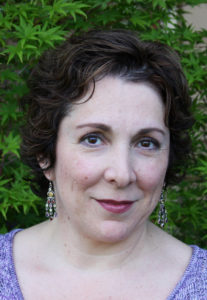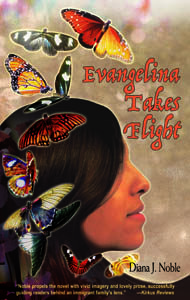Teen Press Corps Member Katie Interviews Author Diana J. Noble
by Katie Cowan, BookPeople Teen Press Corps
Katie Cowan: When did you first realize you wanted to be an author?
Diana J. Noble: Many, many years ago when I was a kid, I wanted to write a book, but I always doubted myself and thought I didn’t have the skills. Once I got into adulthood I thought that I was a good writer, but I do business writing for my job. I didn’t think I was very creative, so I didn’t really think that was an option. Somewhere in my forties I decided just to give it a try and take a class at my local community college. That’s how I got started. I actually realized that I was a lot more creative than I initially gave myself credit for. One thing led to another, and I started meeting people and going to conferences. Eventually, I wound up with a book.
KC: What was that experience like, to write that very first book?
DN: It is a historical fiction, so in many ways it was hard to write. It took me four years to write it, and I had to do a ton of research to understand the time period. It takes place during the Mexican Revolution. It’s also a family story, because it’s based on my grandmother, loosely based. I worked a lot with my father on him telling me his mother’s story and our family history. That was an absolute pleasure because I got to work really closely with my dad. I worked with my mom somewhat too, but mostly with my dad. Then there was just a lot about writing, like is this good, is anyone going to like it? Deep down I felt it was the story that needed to be told. It was a mixture of excitement, and you’re a little scared, and some self-doubt.
KC: What would you say to your younger self?
DN: Don’t be so quick to doubt yourself. I had this idea about my grandmother’s life story; she fled during the Mexican Revolution. All these years I kept telling myself you’re not creative enough. I don’t paint. I don’t draw. I don’t knit. I don’t really do those arts and craft type things. I spent a lot of years listening to that inner critic saying you’re not creative enough. At some point I just decided to give it a try and stop making excuses. I’m glad I finally pushed that aside.
KC: People say writing is very solitary. How did you combat that?
DN: I started a writers group. One writes academic papers, the other two are writing memoirs, and I’m writing fiction, so we’re all kind of different writers. It’s a beautiful thing because they have fresh eyes on your work. Sometimes I think my writing makes sense, but of course it’s coming from inside me and flying out of my fingertips. They look at it and say you skipped over this part or you should flush this out or that I’ve contradicted myself. I have a lot of things about food in the book, so why don’t I say how it smelled? I mentioned them at the beginning of this book, giving them a lot of thanks for their help with it. They gave encouragement too. When I was stuck, they’d encourage me to keep going.
KC: Did you try to write a book as a kid?
DN: I did a lot of writing as a kid, but I never tried to write a book. I did write some poetry as a kid. I first met my husband when I was fourteen, and I knew then and there that I wanted to marry him. I wrote a lot of love poetry and gave it to him. I think he tried to ignore me for some time, but I stuck with it, and we got married when I was twenty-one. So I wrote a lot of love poetry when I was in ninth or tenth grade. Then there was a lot of business writing. A lot of people would come to me asking if I could write this or if I could edit it. I just never thought I could write a book.
KC: Did anything in the book not really go as you had originally planned?
DN:I have a prominent character in the book, Abuelito, and he’s the wise, witty, and fun grandfather. [Evangelina] gets a lot of wisdom and a lot of strength from him. In my mind he was going to die because she goes off to the United States and he stays behind [in Mexico]. I was going to have everyone be heartbroken. I was writing it in a way where he was going to die, but I just changed my mind. I think it worked out better. Hopefully, readers will be glad that Abuelito doesn’t die.
KC: What did you want to be when you grew up?
DN: I just looked back at the stuff that my mom saved from when I was young. I wanted to be a mommy, and then I wanted to be a nurse. Then, I wanted to be a zoologist. There was a famous woman named Jane Goodall who used to work with primates, and I was fascinated with her. When I was in fifth grade I wanted to be a zoologist. I also wanted to be an archaeologist. I was really interested in Prehistoric man. Whenever we had a book report where we picked our own topic it was on that. However, I think I got a little more realistic, thinking there wasn’t a lot of jobs in zoology and archaeology. In the end, I ended up in Human Resourcing, and I think it is a great fit for me.
KC: Do you have any advice for aspiring writers, or traps that they should avoid?
DN: I guess it goes back to some of the things that I’ve already said. Don’t let your inner critic take over. For me it was always on my bucket list to write a book, so if it is something you are passionate about, just get started. I did like involving other people in the process. Just go out and do it and believe in yourself. Keep moving forward.

